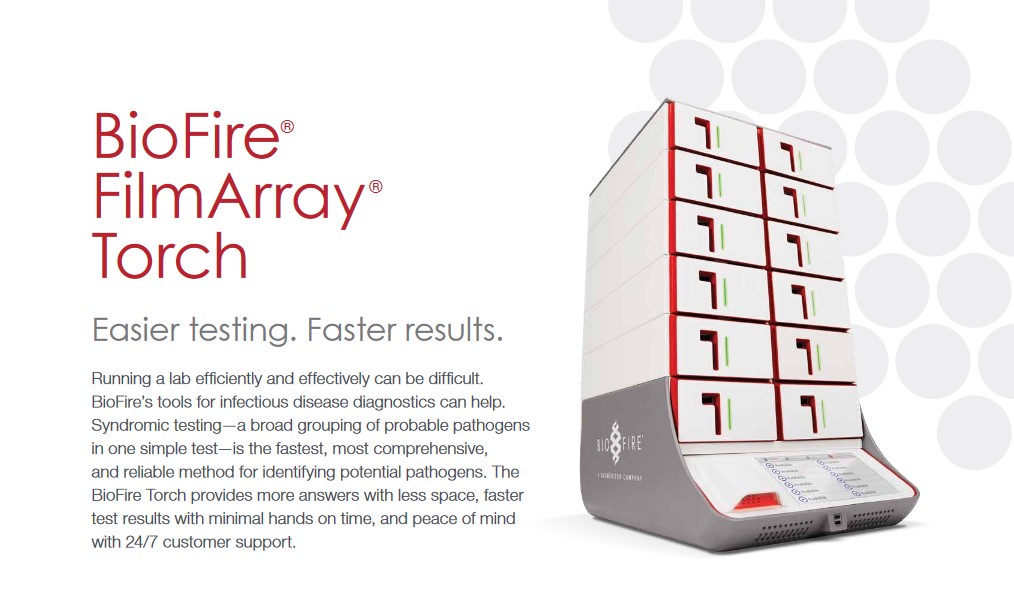
This screengrab from a promotional graphic shows the BioFire FilmArray Torch. A Ketchikan clinic recently purchased the machine, which the clinic’s manager says could cut the time it takes to get COVID-19 test results in the First City. (Screenshot by Eric Stone/KRBD)
A new COVID-19 testing machine is heading to Ketchikan. Officials hope the large-capacity rapid testing platform could mean faster test results for people in communities across Southeast Alaska.
Across the country, many are waiting a week or more to get test results.
In Ketchikan, Wayne Weihing says he recently got a coronavirus test at a free downtown drive-up testing site.
“And it took 18 days to get a verbal response with test results,” he said. “So that was disturbing.”
Weihing said the delay meant his test was irrelevant by the time he got his results. He made the comments on a KRBD call-in show with local mayors and Ketchikan’s top emergency official.
Incident Commander Abner Hoage said the delay likely resulted from a backlog at a private lab in the Lower 48 that Ketchikan authorities have relied on to process tests from the drive-up site.
“And those test results have been taking around two weeks, or maybe a couple days longer than that, which, you’re right, it’s not useful to us as a community; it’s not useful to you as the individual,” Hoage said.
He said that local authorities recently ditched that private lab in favor of the state’s public health lab, but that still means results from the drive-up site take as long as a week to come back.
Traveler testing outside the Ketchikan airport is prioritized above drive-up tests, Hoage said, and generally returns results within three days.
Hoage says some local clinics and Ketchikan’s hospital can run a limited number of tests in-house and return results the same day. But the proprietary chemicals needed to run those tests — known as “reagents” — are in short supply across the country.
Now, one medical provider says Ketchikan’s local testing capacity is set to expand dramatically in the weeks to come. That’s after Creekside Family Health Clinic placed an order for a quarter-million-dollar new testing machine that Ketchikan’s local governments were considering whether to purchase. It’s known as the BioFire Torch.
“So if it ran for a 24-hour day, it could run right at 350 tests,” said Trevor Shaw, Creekside’s clinic manager.
He estimated their lab could run upwards of 100 tests in an eight-hour shift. And he says that high throughput distinguishes it from the nine other testing machines already spread among doctors’ offices and Ketchikan’s hospital.
And that ability to run at scale — far and above recent weeks’ demand for testing in Ketchikan — could allow Creekside to become something of a regional COVID-19 testing hub.
“One of our hopes is that the machine could be potentially used on a regional basis for southern Southeast Alaska to be able to provide testing capacity to other communities nearby — Prince of Wales, Wrangell, Petersburg, Sitka,” Shaw said.
And the platform doesn’t just test for COVID-19 — the automated system tests for nearly two dozen respiratory maladies. Other test kits could allow Creekside to run blood cultures or test for digestive ailments.
The BioFire machine, like the other testing machines in Ketchikan, requires reagents packaged in proprietary test kits. But Shaw says he’s confident that supplies for the new platform won’t be the limiting factor.
“The manufacturer has actually said that their ability to supply our desired volume of reagent — the amount of supplies that they could provide us with could actually exceed the capacity of the machine,” Shaw said.
Each test will cost roughly $135 plus a processing fee. Emergency Manager Abner Hoage has floated paying a flat fee of about $30 to run each test. At current testing levels, that would yield about $12,000 a week to the Ketchikan clinic for processing.
That $165 cost per test is about 40% more than tests sent to private labs. But Hoage says cost isn’t the only factor.
“If we can have results in less than 24 hours for a couple extra dollars and keep our economy and our schools open, then that’s more than likely something we would pursue as a community,” Hoage said, adding, “I think that’s what the community would want us to pursue.”
Generally, after getting a coronavirus test, the patient is supposed to quarantine until their results come back. Hoage says he anticipates a quicker turnaround on test results would mean more people actually stay home until their results come back.
“If I test you today, and you know that you’re going to have to sit and wait for those results for eight or 10 days, you’re much less likely to sit at home and wait than if I tell you you’ll have your results tomorrow,” Hoage said.
And that, he says, would mean less spread of the coronavirus.
Clinic manager Shaw says he anticipates the machine will arrive in mid-August.





